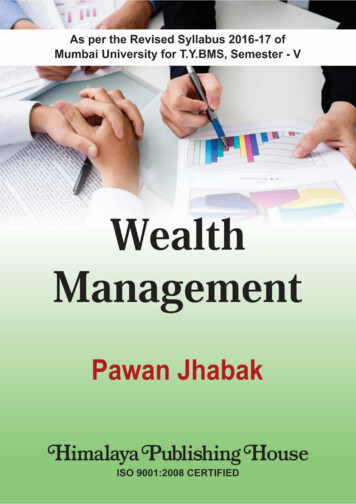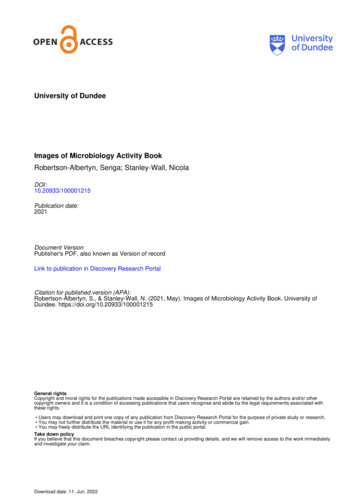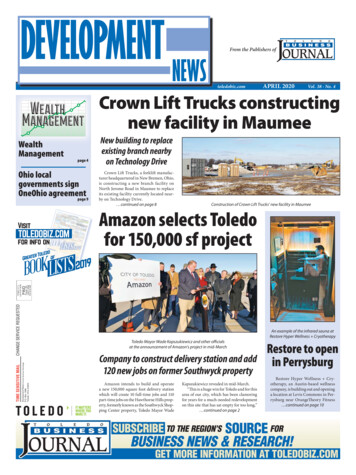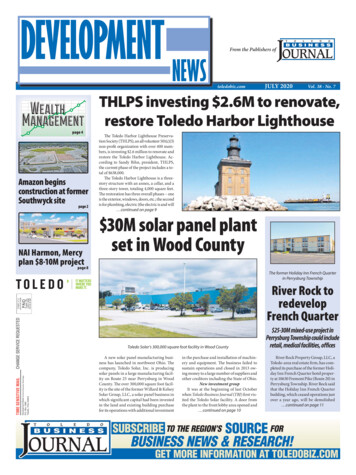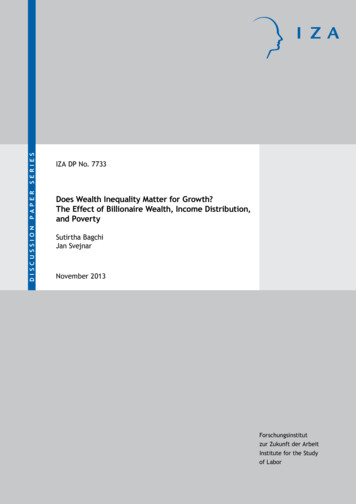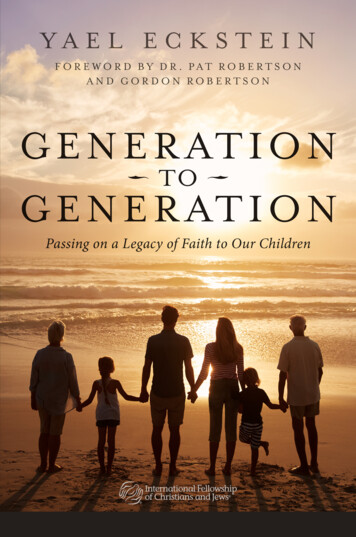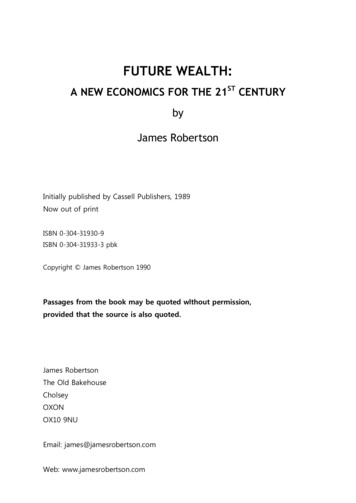
Transcription
FUTURE WEALTH:A NEW ECONOMICS FOR THE 21ST CENTURYbyJames RobertsonInitially published by Cassell Publishers, 1989Now out of printISBN 0-304-31930-9ISBN 0-304-31933-3 pbkCopyright James Robertson 1990Passages from the book may be quoted wlthout permission,provided that the source is also quoted.James RobertsonThe Old BakehouseCholseyOXONOX10 9NUEmail: james@jamesrobertson.comWeb: www.jamesrobertson.com
Future WealthA New Economics for the 21st Century-----------------------James RobertsonPUBLISHED BY -----------------------------------Please note:This book was written sixteen years ago. Many of the addresses of peopleand organizations, and in some cases the names of organizations, havechanged since then. For the sake of historical accuracy I have kept thereferences to them as they were originally published. In most cases up-todate information about them will be found on their websites.James Robertson, December 2005iii
First published 1989 by Cassell Publishers LimitedA book from Mansell PublishingArtillery House, Artillery Row, London SW1P 1RT, England125 East 23rd Street, Suite 300, New York 10010, USA James Robertson 1990All rights reserved. No part of this publication may be reproduced or transmitted inany form or by any means, electronic or mechanical including photocopying,recording or any information storage or retrieval system, without prior permission inwriting from the publishers.British Library Cataloguing in Publication DataRobertson, James, 1928Future wealth : a new economics for the twenty-firstcentury. — (Countdown 2000).1. EconomicsI. Title II. Series330ISBN 0-304-31930-9ISBN 0-304-31933-3 pbkTypeset by Colset Private Ltd, SingaporePrinted and bound in Great Britain by Biddles Ltd, Guildford and King's Lynniv
ContentsIntroductionix1 Changing DirectionAvoiding Catastrophe—A Historic Watershed—Through theBoredom Barrier—The Dynamics of Change—Creating Tomorrowout of Today—The Politics of Economic Transformation12 PrinciplesEnabling—Conserving—Social and Environmental Investment —A Multi-Level One-World Economy—New Economic Concepts123 New Ideas for OldValuing People and the Earth—Beyond Materialism—BeyondProduction and Consumption—Beyond the Impersonality ofCapitalism and Socialism—Beyond Homo Economicus—BeyondValue-Free Economics—Beyond Smith, Marx and Keynes204 PeoplePurposeful Workers—Purposeful Consumers—PurposefulSavers—Reviving the Household Economy—Reviving theInformal Economy—Men, Women, Children and Older People305 PlacesEncouraging Homegrown Local Economies—Investing in LocalSelf-Reliance—The Third Sector—The Economic Role of LocalGovernment—Other Actors in the Local Economy—Cities andCountryside42v
6 NationsIndustrialized Countries—Third World Economies—Investing inthe Capacities of Third World People—Investing in theEnvironmental Resources of the Third World—Investing inEconomic Self-Reliance for the Third World—The Soviet, Chineseand Other Socialist Economies—The Single European Market,1992537 The World EconomyA Multi-Polar Economic World: Two Scenarios—World Taxationand Public Expenditure—A World Currency—InternationalTrade—The IMF and the World Bank—TransnationalCorporations688 OrganizationsThe Boredom Barrier Again—Make-Up of the CorporateEconomy—What Are These Organizations For?—Ownership,Control and Finance—Scale, Size and Type of Business—Decision-Making and Motivation—Business, Management andOrganization Studies809 MoneyMoney as Master—Impersonal and Amoral—A Bird's Eye View—Money as Information—A Network of Flows—The Top Priority9110 TaxesObjectives of the Tax System—A Fundamental Shift—Occupationof Land—Energy and Resources—Waste and Pollution—LocalTaxation—International Taxation—Taxes by Design10211 Incomes and Capital.A Basic Income Scheme—Citizen Capitalists—Co-operativeCapitalists, Self-Reliant Socialists—New Financial Institutions—Priority Tasks11312 Whose Money System Is It, Anyway?A Multi-Level Currency System—Deregulated Currencies—Debt,Interest and Credit—Financial Collapse or Soft Landing?—Moneyas Servant124vi
13 Reorientating the Real EconomyWork—Technology and Industry—Energy—Food andAgriculture—Transport, Housing and Planning—Health—Information and Communication—Education, Leisure and theArts—Peace, Order and Security—Science, Philosophy andReligion13714 Agenda for the 1990s153Some Key Dates—Laying the Foundations—Remodelling the Structure—Redeeming the Money System—Reorientating the Real Economy—TheProspects for SuccessAppendix: The New Economics Movement165Index171vii
viii
Future Wealth: Introductionwww.jamesrobertson.comIntroduction"I believe myself to be writing a book on economic theory which will largelyrevolutionise—not, I suppose, at once but in the course of the next ten years—the way the world thinks about economic problems." Writing to GeorgeBernard Shaw in 1935, John Maynard Keynes overestimated the long-termeffect of The General Theory of Employment, Interest and Money.1 As theend of the century comes nearer, the need to revolutionize the way the worldthinks about economics and organizes economic life is greater than everbefore. We need a new economic order for the 21st century.This new economic order must be geared to the real needs of people andthe Earth. It must be both enabling and conserving. It must restore to theword "wealth" its original meaning of wellbeing. It must harmonize economywith ecology, in accordance with the proper meanings of these words—as themanagement and the science of our earthly home. It must accept that theera of "the wealth of nations" is past, and treat the 21st-century economy asa multilevel one-world economy.Transforming the complex of economic behaviour and thought which makesup today's economic order into this new one will be a process oftransformation more comprehensive and fundamental than that whichKeynes had in mind. It will go beyond economics as economics isconventionally understood. It will go beyond the conventional horizons ofcapitalism, socialism and the mixed economy. It is, in fact, a process alreadywell begun. It started fifteen or twenty years ago,2 and its roots go backmuch further.3 It has begun to accelerate in the last few years as theurgency for it has become more widely apparent.ix
Future Wealth: Introductionwww.jamesrobertson.comDuring these last few years increasing numbers of people in many countrieshave been joining together in this endeavour to transform economic life andthought. This book is for them and for the many more who are coming toaccept the need for a new 21st-century economic order for people and theEarth, or are open to the idea. When I refer to "we" and "us", I have suchpeople in mind. The book's purpose is to help us to see what we should beaiming to do during the 1990s to hasten and smooth the transition to thisnew economic order.This worldwide process of economic transformation cannot, clearly, becompleted in ten years' time. It is not the kind of process that can ever befinally completed. We are not engaged in trying to define an ideal economicsystem, in the hope of eventually being able to achieve it permanently forthe rest of time, let alone the hope of bringing a fully fledged Utopia intoexistence by the Year 2000. We are engaged in changing the direction ofeconomic development and thought, establishing new principles of economicorganisation and practice, and stepping up the momentum of change throughthe 1990s, so that—by the time the Year 2000 arrives—we shall be more orless firmly on course towards a new way of organizing and understandingeconomic life in the 21st century.The fourteen chapters of the book fall broadly into five parts.The first three chapters are about the need for this transformation and itsscale and nature, and about getting these more widely understood and actedon in the early 1990s. Chapters 4 to 8 are about the main structuralcomponents of the one-world economy—people and their householdeconomies, places and their local economies, national economies, the worldeconomy as a whole, and the organizations operating in these variousspheres. Taken together, these chapters outline an evolving structure for theworld economy which will reorientate all its component parts towards a mareself-reliant and conserving path, and in which a primary function of eachlarger unit will be to enable the smaller units it contains—e.g. localities withina nation and households within a locality—to be more self-reliant andconserving.Chapters 9 to 12 are about money, around which so much, though not all,of economic life revolves. They suggest changes in the monetary andfinancial systems of the world and in our understanding of them, which willmake money our servant and not our master. They outline how money couldbecome a fairer and more efficient means for people to conduct transactionswith one another in an enabling and conserving economy. They suggest theneed to reorientate economic life away from its present emphasis on money,for example as regards what we tax (like incomes) and what we measure(like money-based Gross National Product), towards the real economy,including real resources and the real state of existence of people and theEarth. They point to the probability of a world financial collapse before theend of the century. They compare this reorientation towards real life andaway from the abstractions of organized money which is needed now, withx
Future Wealth: Introductionwww.jamesrobertson.comthe one that took place at the time of the Reformation away from theabstractions of organized religion.Chapter 13 briefly suggests how the principles of an enabling andconserving one-world economy apply to particular fields of activity or aspectsof life. As examples it takes: work; technology and industry; energy; foodand agriculture; transport, housing and planning; information andcommunication; health; education, leisure, and the arts; international peaceand security; and science, philosophy and religion.Finally, Chapter 14 outlines a programme for the 1990s, with key stages in1992 and 1994/95.I hope that those who read the book and use it will find it a helpful guide. Ihope they will also treat it as provisional. Indeed, I very much hope they willhelp to make it so, both by their positive actions out in the world and bysuggesting to me how it could be made more useful. Ideally, I would like tosee it, or at least an expanded final chapter, updated and republished inabout 1993 as a guide and stimulus to further progress, and again updatedand republished in about 1996.For those who already know my work, this book builds on past exchangesof information and ideas through the Turning Point newsletter,4 and on myprevious books—Future Work (1985), The Sane Alternative (1978), and theirpredecessors.5 It is about creating an economy for person, society andplanet—in other words, an economy for the sane, humane, ecological (SHE)future, as opposed to the Hyper-Expansionist (HE) future, discussed in thosetwo books. It particularly reflects my involvement in The Other EconomicSummit (TOES) and the New Economics Foundation.6In fact, in the summer of 1986, it was my hope that, following the firstthree years of TOES and the setting up of the New Economics Foundation,those bodies would be in a position to put in hand the preparation of a neweconomics strategy for the 1990s. It was a disappointment that it did nothappen that way. But, although TOES and the New Economics Foundationshould not necessarily be assumed to be behind every idea or proposal that Iam putting forward, I very much hope nonetheless that the book will helpthem and other groups and organizations like them, in other countries aswell as Britain, to take forward their indispensable work through the 1990s. Ialso hope it will encourage people to support them.Over the years I have been helped in so many ways by so many people,including colleagues in TOES and the New Economics Foundation, that itwould be impossible to acknowledge my debt to them all and invidious tothank only a few. Some are named in the course of the book, and manymore in The Sane Alternative and Future Work. But I must againacknowledge my debt to my wife, Alison Pritchard. She has been involved,not just in the writing of this book and reducing some of its faults, but in allthe activities that have led up to it—not to mention the stresses and strainsthat work of this kind sometimes imposes on life at home. I amimmeasurably grateful to her.xi
Future Wealth: Introductionwww.jamesrobertson.comNotes and References1. Quoted in Michael Stewart, Keynes And After, Penguin, 1967.2. E.J. Mishan, The Costs of Economic Growth, Penguin, 1967, and E.F.Schumacher, Small Is Beautiful, Blond and Briggs, 1973, were among thosevoicing the unease about growthmania which surfaced in the late sixties andearly seventies.3. In Britain they include Ruskin and William Morris in the nineteenthcentury, and the Distributists in the early twentieth century.4. The Turning Point newsletter was issued twice yearly from 1976 to 1987by Alison Pritchard and James Robertson (The Old Bakehouse, Cholsey,Oxfordshire 0X10 9NU, England) to an international network of people whoshare a perception that humankind is at a turning point, that old values, oldlifestyles, and old systems of society are breaking down, and that new onesmust be helped to break through. From September 1989 it is being issued asTurning Point 2000 with a sharper focus on the 1990s.5. Details are as follows:Future Work: Jobs, Self-Employment and Leisure after the Industrial Age,Gower/Temple Smith, 1985.The Sane Alternative: A Choice of Futures, Robertson (revised edition), 1983.Power, Money and Sex: Towards a New Social Balance, Marion Boyars, 1976.Profit or People? The New Social Role of Money, Calder and Boyars, 1974.Reform of British Central Government, Chatto&Windus/Charles Knight, 1971.6. Paul Ekins (ed.). The Living Economy, Routledge and Kegan Paul, 1986, isbased on papers given at the first two TOES meetings in 1984 and 1985. Alsosee the Appendix.xii
Future Wealth: 1. Changing Directionhttp://www.jamesrobertson.com1Changing DirectionIn the early 1990s we must aim to get it firmly established in the public mindworldwide that the present path of economic development is leading theworld to catastrophe, and that this is directly connected with the underlyingassumptions and imperatives of conventional economics.We must get it widely accepted that a change of direction is both necessaryand possible, to a new path of economic development for the twenty-firstcentury. The main features of this new development path are discussed inlater chapters. In brief: it should be systematically enabling for people; it should be systematically conserving ot resources and environment; it should treat the world's economy as a multi-level one-world system,with autonomous but interdependent parts at all levels; it should be supported by up-to-date economic ideas.If this transition to a new economic order for the twenty-first century is to besuccessfully achieved, the nature of the process—and particularly its linkswith political change and changes in the structures of power—needs to bewidely understood. This is another aspect of what we must aim to do in theearly 1990s.Avoiding CatastropheThe world's present path of economic development is damaging to bothpeople and the Earth. It is leading the world towards catastrophe. More andmore people understand this. An important task for the early 1990s is tomake sure that politicians and government policy-makers, business leadersand financiers, professionals and organizational people of all kinds, are notallowed to obscure or forget the following facts.1
Future Wealth: 1. Changing Directionhttp://www.jamesrobertson.comThe 1980s have increased the amount of human poverty and misery in theworld, and ecological disaster now threatens. Many people know that today'srates of tropical deforestation, spread of acid rain and other forms of air andwater pollution, soil erosion and the advance of deserts, climatic change fromthe greenhouse effect, depletion of the ozone layer, and mass extinction ofspecies, are unsustainable. By the year 2000, if present trends continue, onethird of the world's productive land will have turned to dust, one millionspecies will be extinct, and the world's climate will be irreparably changed.The terrible famines in Africa are just the most striking among manysymptoms of the growing sickness of people and the Earth, the devastatinglong-term effects of which are just beginning to become apparent.This damage is being done by a world population that is now just over 5billion. Of these 5 billion people, about a quarter live in the so-called"developed" countries and the other three-quarters in "developing" countries.Per capita, the quarter who live in developed countries consume far morethan the three quarters in the developing countries—15 times as muchpaper, 10 times as much steel, and 12 times as much energy. Theconsumption of energy by the 750 million people in the richest countries—theindustrial market economies of Western Europe, North America and Japan—isactually 17 times as high per capita as that of the 2,500 million people in thelowest income countries. So, even with a stationary world population, ifconsumption in poor countries were brought up to present rich-country levelsthis would multiply today's ecological impacts something like ten times over.And world population will not remain stationary. By the Year 2000 it isprojected to rise to 6.1 billion and by 2025 to 8.2 billion. Thereafter, it is notexpected to stabilize below 10.2 billion on some projections and 14.2 billionon others—twice or three times what it is today. For today's rich-countryconsumption levels to be achieved by the whole of a world population of thatsize would mean multiplying today's ecological impacts some twenty or thirtytimes over.'Anyone who thinks this is remotely possible is living in cloud-cuckoo land.So is anyone who believes that the present polarization of the world'spopulation between a wastefully affluent minority and a very much poorermajority can be indefinitely sustained.Although awareness that the world is on course to catastrophe has beengrowing rapidly in recent years, the dominant thrust of conventionaleconomic development offers no solution. Quite the reverse. Moderncommunications, especially television, are hooking the rising population ofthe world more and more firmly on the consumerist values propagated byrich-country businesses and governments. This is evident throughout thenon-socialist Third World. Even in the socialist economies of the Soviet Unionand Eastern Europe—and China too before the terrible events of June 1989—recent economic reforms leave it doubtful whether the switch being2
Future Wealth: 1. Changing Directionhttp://www.jamesrobertson.comattempted is towards a genuinely new path of development or merely to onebased on the consumerist example of the market economies of theindustrialized West. Meanwhile, as the richest countries have been gearingthemselves up to drive still further along the conventional path of economicgrowth—this being, for example, the stated purpose of the single Europeanmarket in 1992 and the 1988 Free Trade Treaty between Canada and theUSA—the wealth gap grows wider between rich countries and poor, andbetween rich people and poor people within each country.A top priority for the early 1990s is to get it firmly established in the publicmind worldwide that this whole process is sinfully shortsighted, and thathuman beings are capable of something better.An important aspect of this will be to destroy once and for all the notionthat economic growth, as conventionally measured and understood, issynonymous with economic and social progress or prerequisite to it. Ifcontinued economic growth involves the continued growth of human povertyand dependency, and the continued growth of environmental destruction,then it is bad -unequivocally. If it means technically, as it actually does, thecontinued growth of the total value of monetary transactions in the economy,then it may or may not be good or bad—depending on who is paying whomhow much to do what. But to aim to achieve it for its own sake is, at best, tomistake the shadow for the substance. It was a shame that the BrundtlandCommission whose report, Our Common Future, contained so much valuableand sensible analysis of the problems now facing humanity, felt it necessaryto go along with the call for a new era of economic growth.2 Its contributionto understanding is consequently much more limited than it might otherwisehave been.A Historic WatershedAnother important task for the early 1990s is to get it understood that thesepotentially catastrophic developments throughout the world economy stemdirectly from the basic tendencies and assumptions of conventional economicpractice and thought. These basic tendencies and assumptions include: the tendency to create and reinforce economic dependency for people,localities and nations; the tendency to be wasteful of natural resources and damaging to thenatural environment; the assumption that economics is about the wealth of nations, and thatthe paramount unit for economic policy-making must be the nationstate.3
Future Wealth: 1. Changing Directionhttp://www.jamesrobertson.comThese key features of the present economic order go back to the 17th and18th centuries. Modern economic development began with the deliberatecreation of dependency, when the common people were pushed off the land,excluded from their subsistence way of life, and made dependent on paidlabour. Modern economic thinking had its roots in the perceptions of theEnglish philosophers Bacon and Hobbes—of nature as a limitless resource tobe exploited for "the relief of the inconveniences of man's estate", of wealthas power to command other people's labour, and of human life as anincessant competitive struggle for power.When Adam Smith came to analyse the workings of the economy of his dayhe followed Bacon's and Hobbes' perceptions of "man" and nature andsociety. In emphasizing the impersonal role of the market—its invisiblehand—and in excluding moral considerations from his analysis of economiclife, he was following Newton's example of value-free system-building in thesciences. That Smith also emphasized the wealth of nations, rather than thewealth of people or cities or the world, that he took material production andconsumption as the essence of economic life, and that he focused exclusivelyon activities accompanied by monetary exchange, reflected the most notableeconomic phenomena of his own time: the struggles between Europeannations to dominate overseas trade; the astonishing growth of industrialproduction; and the unprecedented division of labour that accompanied it.Smith's historical significance was that he articulated a new way of lookingat economic life. He thus helped to crystallize a new economic order in placeof the vanished medieval economic system which had been conceptuallybased on the rights and obligations of a divinely sanctioned, static,hierarchical society. That gives a measure of our task today. For the time hascome again, as it had in Adam Smith's day, to crystallize a new economicorder in place of that which is now failing. The new economic order needednow will be one that reflects the needs and realities of a 21st-century worldas far removed from Smith's as his was from the middle ages.Through the Boredom BarrierIn seeking to steer 21st-century economic development in a new direction,we must recognize an important fact. For many good and sensible people theeconomy and the "dismal science" of economics have become so abstractand technical, so much the province of supposed experts, and—in a word—soboring, that they have given up trying to make sense of them. The result isthat comparatively few people—apart from people with obvious commercialor political axes to grind—have taken a sustained and purposeful interest inthe need for fundamental economic change. There have been morecomprehensible, rewarding and obviously urgent causes to claim people'ssupport, such as the immediate relief of disaster, poverty and famine, andthe conservation of wildlife.4
Future Wealth: 1. Changing Directionhttp://www.jamesrobertson.comWe need to recognize this. But we should not be put off by it. In the lastfew years, active supporters of many of these more specific, moreimmediately urgent causes have become aware that today's economic orderstands in the way of what they are working for and is at the root of many ofthe problems they face. It is, after all, the prime cause of ecological disaster,poverty and famine, and the destruction of wildlife.Growing numbers of social and environmental activists and their supportersand sympathizers now recognize that economics as conventionallyunderstood is not an objective science which must be accepted on its ownterms, but an unsound way of thinking that mystifies and distorts both thereality and the morality of people's behaviour towards one another and thenatural world. They have learned by experience that economic orthodoxy ofwhatever variety—capitalist, socialist or a mixture of the two—damages whatthey care about and systematically obstructs what they are trying to do.I am thinking of people who support organizations like Oxfam, Christian Aidand the World Development Movement, working to relieve poverty andfamine and to help with economic progress in the Third World; like theWorldwide Fund for Nature (WWF), Greenpeace and Friends of the Earth,working to conserve the natural world and the environment; likeSchumacher's Intermediate Technology Development Group, working todevelop environmentally safe, people-friendly technologies; like the UnitedNations Association, working to develop effective forms of government for aone-world human community; like the Quakers and other religious groups,working for social and economic justice; like Survival International, workingto protect threatened tribal and indigenous peoples in many parts of theworld; like the Soil Association and Compassion in World Farming, workingfor humane and ecologically safe farming methods; and people withcountless equally vital concerns in fields such as health, food, poverty,unemployment, housing, education, co-operatives, inner cities, thecountryside, the rights of women and ethnic minorities, peace anddisarmament, and many more.Supporters of causes like these and many others, as well as millions ofpeople in their day-to-day lives, find themselves thwarted by the perversedrives and imperatives of conventional economics. They have been learningby experience that, although they are working in a wide variety of differentfields and different ways, in one important respect they belong to a singleworldwide community of people and organizations, movements and groups.They all share a common interest in changing the practices, policies,assumptions and imperatives of conventional economics.5
Future Wealth: 1. Changing Directionhttp://www.jamesrobertson.comSo another urgent task for the early 1990s is to break through the boredombarrier surrounding economics, and to develop a common framework ofunderstanding and action for change. The aim must be to help manydifferent people, including social and environmental activists and theirsupporters in many different fields, to see how—without centralized coordination—they can reinforce one another's efforts to create a new economicorder less damaging to their concerns than the one that now exists.3The Dynamics of ChangeThe transformation of today's economic order into a new one will be aprocess of great magnitude and complexity. Another task for the early 1990swill be to generate widespread understanding—not of all the details of thisprocess and all the cross-links between them, which would be beyond anysingle human mind—but understanding of what sort of a process it will be,what it will involve, what dangers it will throw up, and how these should bedealt with.To start with, we shall need to recognize that innumerable cross-cuttingconflicts of interest and judgement will arise between those who are pressingfor change or see the necessity for it, and those who are resisting it or don't.Those who oppose one another on some issues will support one another onothers. It will not be necessary for people to pretend they agree with oneanother on everything, like party politicians subscribing to a manifesto,before they can cooperate with one another on anything.In support of change there will be both negative and positive factors. Interms of events and happenings, negative factors will include growingevidence of social and environmental degradation and disastrous incidentslike Chernobyl, which heighten awareness of the dangers of conventionaleconomic development. Positive factors will include many successful real-lifeexamples of enabling and conserving initiatives, such as self-build housingschemes, poor people's banks, and energy conservation schemes. In termsof ideas, the negative side will include critical exposures of the inadequaciesand absurdities of conventional economic practice and thought. The positiveside will include ideas that clarify and illuminate the scope for a new enablingand conserving approach, and inspire people to commit themselves to it.In terms of action, many different kinds of effective action will make theircontribution: at different levels—personal, local, national and international; of different types—through practical initiatives, through political andgovernmental processes, through the exercise of economic choice, andthrough information and communication, research and studies,campaigns and lobbying, conferences and publications, stunts anddemonstrations; and6
Future Wealth: 1. Changing Direction http://www.jamesrobertson.comwith differen
Robertson, James, 1928- Future wealth : a new economics for the twenty-first century. — (Countdown 2000). 1. Economics I. Title II. Series 330 ISBN 0-304-31930-9 ISBN 0-304-31933-3 pbk Typeset by Colset Private Ltd, Singapore Printed and bound in Gr
